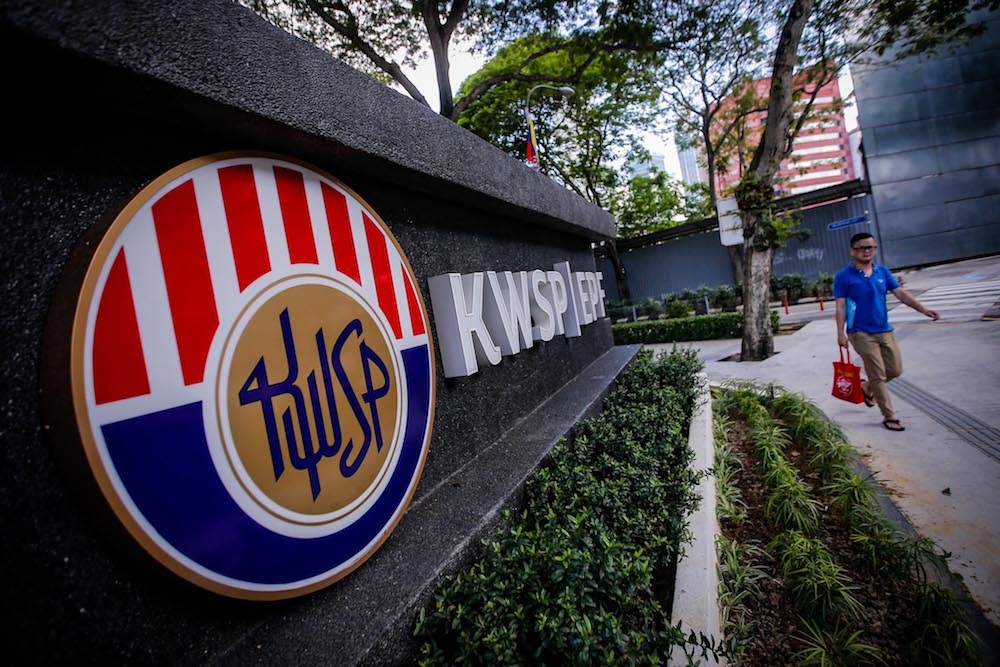EPF’s commitment to domestic market shows availability of investment opportunities

The Employees Provident Fund (EPF) logo is seen at its headquarters on Jalan Raja Laut January 22, 2020. — Picture by Hari Anggara
Follow us on Instagram and subscribe to our Telegram channel for the latest updates.
KUALA LUMPUR, March 9 — The Employees Provident Fund’s (EPF) commitment to the domestic market shows that it sees good value and growth opportunities in all stages of the investment cycle, from the pre-initial public offering (IPO) fundraising stage right up to long-term shareholding.
Bursa Malaysia Bhd’s chief executive officer (CEO) Datuk Muhamad Umar Swift said institutional investors like the EPF, as well as foreign and retail investors, play an important role to ensure that the Malaysian equity market remains on the radar of global investors.
“Along with the economic recovery and the return of foreign interest in emerging markets, we can expect more trading activities in the Malaysian capital market this year,” he told Bernama.
Muhamad Umar was commenting on EPF’s plan to increase its investments in various domestic asset classes in 2022, following the reopening of economic sectors and businesses in the country.
Last week, EPF CEO Datuk Seri Amir Hamzah Azizan said the pension fund is looking to allocate RM1 billion this year to invest in companies that are at the pre-IPO stage.
“We have not seen enough stimulus going into Bursa (Malaysia). We have seen investment traps where companies move on from the venture capital market to pre-IPO, so there is a gap in that market.
“Towards the later stage of the pre-IPO, there is a stage that the EPF can play, because we see that we can manage the risk element and we see fairly good returns there.
“We are working with specific funds to promote that, and we are looking at companies which are at (that) stage,” he said during a media briefing on the EPF 2021 financial performance.
Amir Hamzah said as a major investor in Malaysia’s financial markets, the move would help catalyse economic activities and assist in the country’s economic recovery.
Recently, Putra Business School associate professor Prof Dr Ahmed Razman Abdul Latiff told Bernama that for 2022, the EPF is committed to investing around RM64 billion in various domestic asset classes.
“As a major investor in the Malaysian financial market, it will help in catalysing economic activities and continues to assist in restoring the economy. This will help encourage growth, create job opportunities as well as increase tax revenue for the country,” he added.
Ahmed Razman said with the reopening of international borders and the domestic vaccination rate being among the best in the world, Malaysia is poised for recovery this year.
Meanwhile, Sunway University economics professor Prof Yeah Kim Leng said it will be synergistic to support good quality pre-IPO companies that boost the stock exchange while helping local firms to access the capital markets as well as enabling the investing public to partake in the company’s growth prospects.
“As a pension fund, EPF’s over-arching investment objective is capital preservation through consistent application of sound management practices and prudent risk diversification strategies.
“Given the rising risks and uncertain global market outlook, it may be appropriate to increase investments in the local market, in line with the expectations of a better domestic economy and financial markets this year,” he said.
However, Yeah said this ‘win-win’ strategy requires good investment skills, business acumen and objectivity in identifying the potential companies for listing.
He said that the fund has to guard against being used as a vehicle by entrepreneurs to cash out after listing.
“Given that there are not that many new listings in the local bourse, EPF’s exposure to this asset segment is not expected to be large, but it could strengthen the EPF’s asset diversification and provide higher returns, given that entities typically increase their market valuation in multiples when listed.
“Besides enlivening the local bourse by participation as an ‘anchor investor’, the investing public will also have greater confidence to invest in such IPOs, thereby increasing stock market liquidity,” he said.
On the flip-side, Yeah opined that with EPF being an overly dominant and trusted institutional investor, the IPO market may be subject to ‘excessive exuberance’, which would not be good for the stock market and financial stability.
Nevertheless, with more companies gaining access to new capital, the companies will be able to expand their production and business activities, thereby boosting economic recovery as well as enhancing the resilience of the firms with enlarged capital, he said.
Meanwhile, Juwai IQI chief economist Shan Saeed said that the EPF’s plan is a strategic move to bolster domestic equities.
“Global equities, especially those of the United States and Europe, will remain under pressure and are heading for a big correction. Malaysia equities—despite being small—has upside potential with attractive valuation.
“This would help the domestic economy and boost the outlook for asset classes locally. As the saying goes, in tough times, home is the safest place,” he said.
He added that the move will also send a positive signal to the market that local investors have confidence in the economy. — Bernama